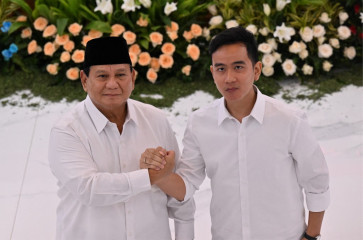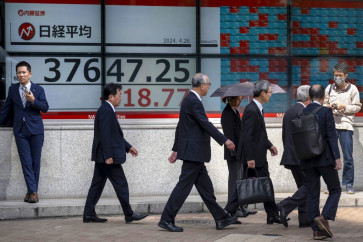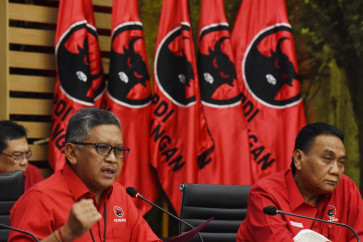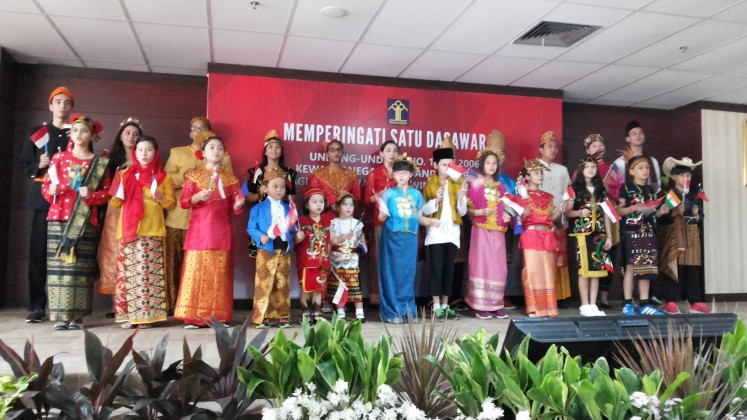Money politics blamed for voter apathy
Analysts are attributing voter apathy to rampant money politics in legislative races, saying that cash payments are likely to be a deciding factor in the 2014 elections
Change Size

A
nalysts are attributing voter apathy to rampant money politics in legislative races, saying that cash payments are likely to be a deciding factor in the 2014 elections.
Since most legislative candidates and political parties lacked the networks needed to reach voters, electoral apathy would persist, according to one analyst.
“Most voters will remain apathetic, because they are in dark over most political parties and their platforms,” political observer Yunarto Wijaya said over the weekend.
“Candidates are not likely to have emotional ties with voters who they approach on the eve of election day and are abandoned soon after the polls. Only parties with traditional supporters and those with financial sources can win seats in the House and in local legislative councils,” Yunarto said over the weekend.
The Golkar Party, the Indonesian Democratic Party of Struggle (PDI-P) and the United Development Party (PPP) are some parties that currently have loyal followings and are likely get significant votes in 2014.
Meanwhile, President Susilo Bambang Yudhoyono’s Democratic Party and the Prosperous Justice Party (PKS) will face their greatest test in the upcoming election, after series of graft allegations were leveled at senior executives from both parties.
“Based on Charta Politika’s recent survey on the psychology of voters, they will remain loyal to certain parties after they vote for a party for three consecutive elections,” Yunarto said.
He said that the survey also found that swing voters would support parties and candidates who gave them cash payments.
Another observer, Suhardi Suryadi from the Institute for Social and Economic Research, Education and Information (LP3S) said that only 10 political parties that would run candidates in 2014 election, predicting that none would gain a majority of the vote.
Suhardi said that he expected that the Democratic Party would suffer a pronounced slump in 2014, especially given that some of its most prominent politicians have been convicted and imprisoned for corruption.
Suhardi, however, predicted that the Democratic Party would still fare well in 2014.
“The Democratic Party will still be in the top three, with Golkar at the top and the PDI-P in third. The Democratic Party still has two years to make major changes and repair the party’s tarnished image to win the hearts of voters,” he said.
Ways for Yudhoyono to improve the party’s standing would be to cleanse his government of corrupt officials or to use the 2013 state budget to pay for populist programs, according to Suhardi.
“The Democratic Party needs to reboot its political engine, support government programs and start reaching out to people in subdistricts, villages and remote areas,” he said.
Last week, graft watchdog Indonesian Corruption Watch (ICW) warned about a possible resurgence of political corruption in 2013.
The ICW said that due weak implementation of ill-conceived political party financing regulations, almost all parties would seek campaign funds from illicit sources, including tapping governmental budget allocations.
The ICW also said that Golkar had the largest number of members implicated in corruption cases, followed by the Democratic Party.
With more politicians potentially earning money from illicit sources, the Corruption Eradication Commission (KPK) has pledged to step up preventive measures.
Contacted separately, Democratic Party Deputy-Secretary-General Saan Mustopa said that the party would not resort to money politics and would instead intensify its voter outreach programs.
“All Democratic Party lawmakers and councillors in regency and municipal legislatures were instructed during the recent national meeting in Bogor to get in touch with their constituents and meet all new voters,” Saan said.
“This national agenda is set to repair the party’s badly tarnished image and to boost the economic development in the next two years before the elections.”









